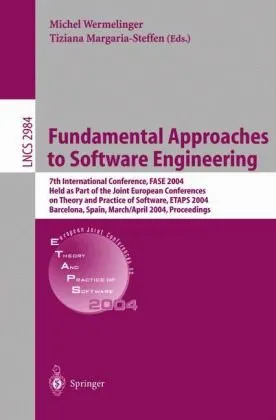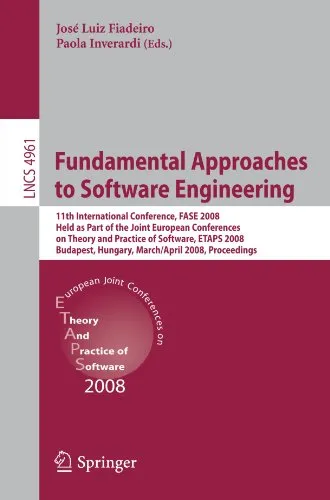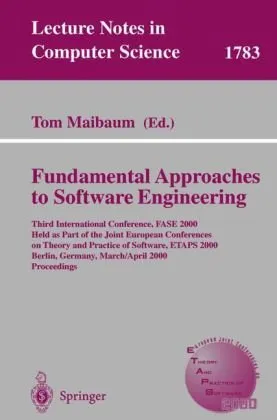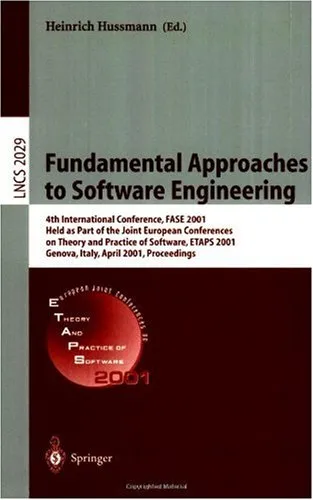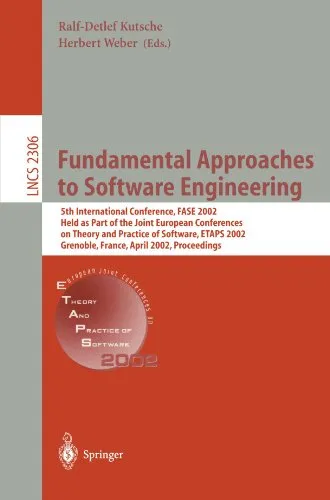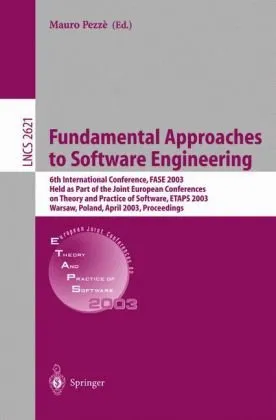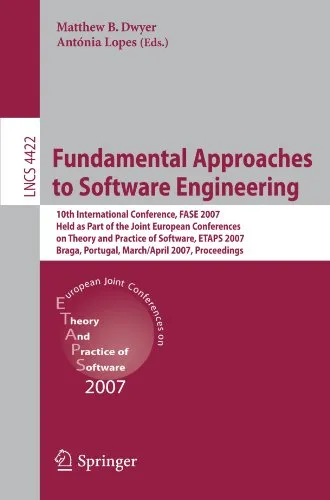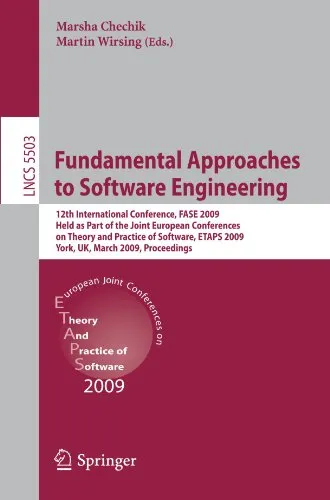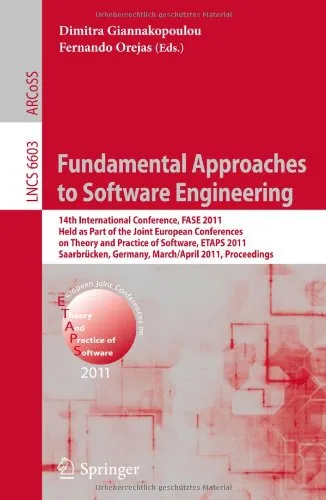Fundamental Approaches to Software Engineering: 7th International Conference, FASE 2004. Held as Part of the Joint European Conferences on Theory and Practice of Software, ETAPS 2004, Barcelona, Spain, March 29 - April 2, 2004. Proceedings
4.0
بر اساس نظر کاربران

شما میتونید سوالاتتون در باره کتاب رو از هوش مصنوعیش بعد از ورود بپرسید
هر دانلود یا پرسش از هوش مصنوعی 2 امتیاز لازم دارد، برای بدست آوردن امتیاز رایگان، به صفحه ی راهنمای امتیازات سر بزنید و یک سری کار ارزشمند انجام بدینکتاب های مرتبط:
مقدمه
کتاب Fundamental Approaches to Software Engineering که به همت Serge Abiteboul، Michel Wermelinger و Tiziana Margaria-Steffen تدوین شده است، نتایج و مقالات ارائه شده در هفتمین کنفرانس بینالمللی FASE که بخشی از مجموعه نشستهای اروپایی مرتبط با Theory and Practice of Software (ETAPS 2004) بوده را در بر میگیرد. این کنفرانس بهطور ویژه در تاریخ ۲۹ مارس تا ۲ آوریل ۲۰۰۴ در بارسلونای اسپانیا برگزار شده است و نقش اساسی آن در ارتقای دیدگاههای علمی و صنعتی مهندسی نرمافزار غیر قابل انکار است.
خلاصه جامع کتاب
کتاب پیشرو بهطور جامع به زمینههای بنیادی مهندسی نرمافزار پرداخته و شامل مجموعه متنوعی از مقالات پژوهشی است که در کنفرانس FASE 2004 ارائه شدهاند. این کنفرانس بستری برای پژوهشگران، مهندسان و متخصصان نرمافزار فراهم آورده تا آخرین دستاوردها، علایق و چالشهای فنی را به اشتراک بگذارند. موضوعات این کتاب شامل بهینهسازی نرمافزارها، مدلسازی رسمی (Formal Modeling)، تحلیل سیستمهای پیچیده، و توسعه ابزارهای پیشرفته است که همه این موارد نقشی کلیدی در تحول آینده نرمافزارها دارند.
هر بخش از این کتاب بیانگر دیدگاههای نوین در زمینه رویکردهای نظری و کاربردی به طراحی، تست، و نگهداری نرمافزارها است. تأکید ویژهای بر همگرایی تحقیقات دانشگاهی با نیازهای صنعتی شده و این کتاب ترکیبی از دادههای عملی و پیشرفتهای تحقیقاتی را گردآوری کرده است تا مخاطبان خود را از آخرین پیشرفتهای علمی آگاه کند.
نکات کلیدی
- معرفی روشهای رسمی در تحلیل و طراحی نرمافزار
- مدلسازی پیشرفته برای سیستمهای توزیعشده
- نقش متدولوژیهای جدید در توسعه نرمافزارهای مدرن
- توسعه ابزارهای هوشمند برای تست خودکار نرمافزار
- ارتباط میان نظریه و عمل در فضای نرمافزار
جملات مشهور از کتاب
"The demand for scalable, reliable and efficient software solutions has placed a greater emphasis on fundamental engineering principles."
"Modeling is not just a tool; it is the language of software design evolution."
چرا این کتاب مهم است؟
اهمیت این کتاب در جمعآوری آخرین دستاوردها و پژوهشهای برجسته در حوزه مهندسی نرمافزار نهفته است. از آنجا که کنفرانس FASE یکی از معتبرترین رویدادهای علمی در این زمینه به شمار میرود، مقالات و مباحث ارائه شده در این کنفرانس از اعتبار علمی بالایی برخوردارند. این کتاب به مخاطبان ویژه خود مانند دانشجویان، پژوهشگران، و متخصصان نرمافزار این امکان را میدهد که به دیدگاهی جامعتر در زمینه توسعه نرمافزارهای کارا و مقیاسپذیر دست یابند.
علاوه بر این، این مجموعه فرصتی بینظیر برای بررسی چالشهای واقعی و معرفی ابزارها و روشهای نوآورانهای است که میتوانند آینده توسعه نرمافزار را دستخوش تغییرات مثبت کنند. تمرکز کتاب بر تلفیق نظریه و عمل، یک رویکرد جامع به توسعه نرمافزار ارائه میدهد که نه تنها بر نیازهای فعلی، بلکه بر روندهای آتی نیز تأکید دارد.
Introduction to "Fundamental Approaches to Software Engineering: FASE 2004"
Software engineering is at the heart of building robust, dynamic, and reliable systems in an ever-changing technological world. The book, "Fundamental Approaches to Software Engineering: 7th International Conference, FASE 2004", serves as a detailed compendium of contemporary research and advances in software engineering as presented at the 7th International Conference, held in Barcelona, Spain.
This book was conceived as part of the Joint European Conferences on Theory and Practice of Software (ETAPS 2004), highlighting a wide spectrum of pressing challenges, innovative methodologies, and practical solutions explored by leading experts in the field. An essential reference for researchers, practitioners, and educators, it bridges theoretical underpinnings and practical applications, creating a roadmap for future advancements.
The volume comprises carefully selected and peer-reviewed papers, showcasing a blend of theoretical insights and practical methodologies. The authors present contributions that address specification, design, analysis, testing, and evolution of software systems. This collection ensures that readers obtain diverse perspectives on improving software quality, reducing development complexity, and optimizing performance.
Detailed Summary of the Book
The proceedings cover recent contributions to software engineering using fundamental approaches, with precise relevance to both industry and academia. The book captures the presentations and discussions from the conference, divided into distinct sections covering key areas such as:
- Modeling and specification languages for software systems
- Formal verification and validation techniques
- Applications of mathematical formalisms in software engineering
- Program analysis, transformation, and synthesis
- Component-based and aspect-oriented software design
- Tools and frameworks for automated software development
Each paper stands as a contribution to understanding how advanced theories are brought into practice, enabling readers to delve into the experimental results and applied methodologies. Major themes include bridging the gap between formal theoretical frameworks and their application to everyday software development practices.
By interweaving foundational knowledge with innovative techniques, this book provides vital insights into topics such as requirements engineering, software modeling, program transformation, and quality assurance. It encapsulates the evolution in software engineering from theoretical constructs to real-world implementations.
Key Takeaways
- The role of formal approaches in enhancing software reliability and correctness.
- Innovative modeling techniques that streamline software system design and implementation.
- The significance of automated tools in reducing human error and improving development efficiency.
- Bridging theoretical frameworks with practical software solutions for real-world applicability.
- Advanced methods for program analysis, transformation, and synthesis that address modern engineering challenges.
Famous Quotes from the Book
"Software engineering is more than just writing code; it’s about creating a lasting synergy between precision in design and flexibility in implementation."
"Formal verification is not an option anymore, but a necessity for developing fault-tolerant and future-proof applications."
"Incorporating modern tools and automation techniques is the cornerstone to advancing software engineering as a discipline."
Why This Book Matters
The importance of "Fundamental Approaches to Software Engineering" lies in its ability to provide a snapshot of the state-of-the-art approaches in software engineering during a pivotal time in the early 2000s. It enables readers to comprehend the challenges that shaped the modern software landscape and how innovative solutions were formulated to address them.
This book is significant for several reasons:
- Guidance for Researchers: It serves as a foundation for aspiring researchers to understand the rigorous methodologies employed in solving complex engineering problems.
- Relevance for Practitioners: The discussed tools and strategies have practical implications for developers and software architects, providing frameworks and techniques to enhance their workflows.
- Educational Significance: The book functions as a valuable resource for university courses that aim to integrate theoretical knowledge with applied software engineering practices.
With its deep dive into the intersection of theory and practice, this book is an indispensable resource for anyone looking to advance their understanding of fundamental software engineering approaches.
دانلود رایگان مستقیم
شما میتونید سوالاتتون در باره کتاب رو از هوش مصنوعیش بعد از ورود بپرسید
دسترسی به کتابها از طریق پلتفرمهای قانونی و کتابخانههای عمومی نه تنها از حقوق نویسندگان و ناشران حمایت میکند، بلکه به پایداری فرهنگ کتابخوانی نیز کمک میرساند. پیش از دانلود، لحظهای به بررسی این گزینهها فکر کنید.
این کتاب رو در پلتفرم های دیگه ببینید
WorldCat به شما کمک میکنه تا کتاب ها رو در کتابخانه های سراسر دنیا پیدا کنید
امتیازها، نظرات تخصصی و صحبت ها درباره کتاب را در Goodreads ببینید
کتابهای کمیاب یا دست دوم را در AbeBooks پیدا کنید و بخرید
1186
بازدید4.0
امتیاز0
نظر98%
رضایتنظرات:
4.0
بر اساس 0 نظر کاربران
Questions & Answers
Ask questions about this book or help others by answering
No questions yet. Be the first to ask!
